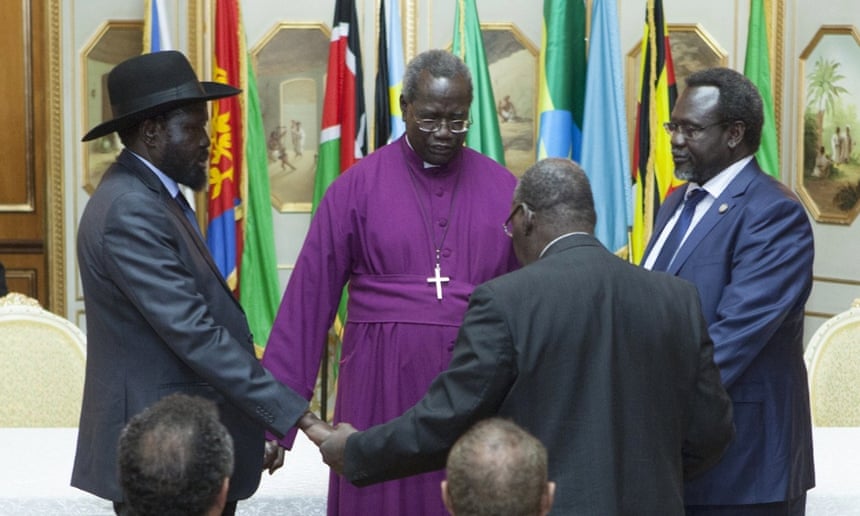Neither leader of South Sudan’s warring factions should serve in a caretaker government because of their responsibility for “organised massacres and large-scale violence”, according to a leaked African Union (AU) report that emerged as the latest round of talks on stopping the country’s 14-month civil war ended without agreement.
The draft report blames South Sudan’s president, Salva Kiir, and his former vice-president, Riek Machar, for much of the bloodshed that split the country along ethnic lines, pitting Kiir’s Dinkas against Machar’s Nuers. It says Nuers in the capital, Juba, were “ethnically cleansed” at the outbreak of the fighting, and recommends that Kiir, Machar and other ministers in power before the cabinet’s dissolution in July 2013 “be barred from participation in the transitional executive”.
Seven ceasefires have failed in South Sudan, which erupted in violence in December 2013 after Kiir accused Machar of plotting a coup. Talks brokered in the Ethiopian capital Addis Ababa by the Intergovernmental Authority on Development (Igad) have stalled several times.
The controversial report on human rights abuses, which has been shelved for two months, was leaked to Reuters on 5 March. It holds Kiir and Machar responsible for the country’s descent into civil war and for “the organised massacres and the large-scale violence that followed”.
It suggests that the AU work with the UN to appoint a three-person panel charged with overseeing a five-year transition plan. The report also proposes that South Sudan’s oil revenues be placed in a holding account managed by the African Development Bank and recommends establishing an AU-commanded peacekeeping force comprised of troops “without prior involvement or direct interest in South Sudan”.
The document is also fiercely critical of the US, Britain and Norway, which it accuses of “[ushering] in an unaccountable political class” by backing the 2005 peace deal that paved the way for South Sudan’s independence from Sudan six years later.
That deal, it says, established “a politically unchallenged armed power in South Sudan” that acted with impunity and legitimised “rule of the gun”.
Neither the AU nor the UK’s foreign office responded to requests for comment.
The report raises further questions about the credibility of the peace talks, which many had expected to pave the way for a transitional government led by Kiir, with Machar again serving as his deputy.
On 6 March Kiir and Machar missed Igad’s deadline for reaching a final peace deal that would have included a transitional unity government, despite a UN security council resolution establishing a sanctions regime threatening to blacklist anyone undermining security or interfering with the peace process. The US-drafted measures, however, stop short of worldwide travel bans, asset freezes or an arms embargo. No date has been set for further peace talks.
The Ethiopian prime minister and Igad chairman, Hailemariam Desalegn, said failure to reach an agreement to end “a senseless war” was prolonging the suffering of the South Sudanese people and was “unacceptable, both morally and politically”.
Hailemariam said the peace process had to be “reinvigorated and reformed”, adding: “In the coming days, I will consult with my colleagues, the Igad leaders, partners and friends in the region, on the continent, and beyond to agree a common plan of action.”
The AU has come under fire from rights groups for failing to publish the report. Casie Copeland, South Sudan researcher for the International Crisis Group, said: “The AU should take leadership in the field of transitional justice or cede the field to others willing to take action to move these necessary processes forward.”
Daniel Bekele, Africa director at Human Rights Watch, said: “The people and partners of South Sudan have been waiting for the AU report to help bring justice for the grave crimes of the past year. By shelving the report, the AU has left the people of South Sudan in the lurch.”
Tens of thousands are thought to have died in the fighting, which has displaced 1.5 million people internally and forced another 480,000 into neighbouring countries. Although famine was averted last year, the Famine Early Warning System Network warned this week that 3.5 million people in South Sudan will require emergency humanitarian assistance by June.
Despite the warring sides agreeing to a ceasefire on 1 February, reports of sporadic fighting between government and rebel forces have emerged as recently as 18 February, when skirmishes were reported around Bentiu, Renk and Melut. Igad has been blasted for failing to properly monitor these clashes, as both sides scramble to capture more territory between each round of peace talks.
